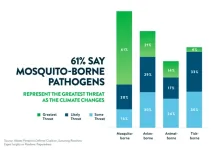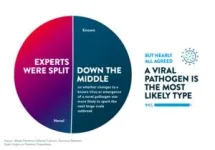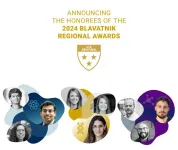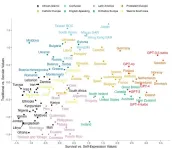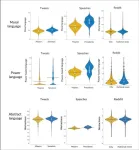(Press-News.org) Survey reveals that infectious disease experts see the need to address gaps in surveillance programs to identify emerging pathogens, public health funding and testing infrastructure capabilities
They point to viral pathogens and mosquito-borne pathogens as likely to spark outbreaks as humans, animals and viruses overlap; and new viruses are as concerning as changes to existing viruses
Experts believe robust tracking of changing insect range, animal habitats and their migrations and extreme weather events are important to understanding infectious diseases and changing risk patterns
ABBOTT PARK, Ill., Sept. 17, 2024 — Abbott announced the findings of a new survey among leading infectious disease experts around the world on the state of pandemic preparedness and found that while most agree that preparation has improved since the COVID-19 pandemic, respondents say significant gaps remain in building surveillance programs to identify emerging pathogens, public health funding and having adequate testing infrastructure capabilities.1
The survey, commissioned by the Abbott Pandemic Defense Coalition, asked more than 100 experts in virology, epidemiology and infectious diseases around the world about their priorities for addressing the gaps in readiness for disease outbreaks, their views on how the changing environment is impacting infectious diseases, and their suggestions for building a resilient healthcare system capable of identifying and responding to emerging disease outbreaks around the world.
"Just as scientists have developed sophisticated monitoring systems to track emerging storms and hurricanes, our job as virus hunters is to identify pathogens that have the potential to spark outbreaks in order to stay one step ahead," said Gavin Cloherty, Ph.D., head of infectious disease research at Abbott and head of the Abbott Pandemic Defense Coalition. "Disease surveillance acts as our radar, helping us prioritize which viruses are most likely to trigger an outbreak and where those outbreaks may occur."
When asked to classify the types of pathogens that are most likely to start outbreaks:1
Respondents were evenly split on whether a new pathogen (50%) or changes in a known disease (50%) were a bigger threat for large-scale outbreaks.
Nearly all (94%) believe viral pathogens are most likely to lead to widespread outbreaks, followed by bacteria, fungal and parasitic infections.
A pathogen that is highly transmissible, a novel virus with no tests, treatments or vaccines available, and a virus that can transmit silently are the factors most likely to accelerate a local outbreak into an epidemic or pandemic; a known pathogen that's now drug resistant to treatments, a virus that causes high mortality, or one with high morbidity were less likely.
The survey also asked infectious disease experts their perspective on the impact changes in the climate could have on the severity and frequency of infectious disease outbreaks, including extreme weather events and where insects and animals live. Experts identified mosquito-borne pathogens (61%) as representing the greatest threat to human health as the climate changes, compared to avian (21%), animal (14%) or tick-born (4%) pathogens.1
Viruses from mosquitoes – including dengue fever, Zika virus, West Nile virus and malaria – are common in tropical areas, including Latin America, Africa and Asia. Scientists are finding that warming temperatures and more flooding are pushing mosquitos that can carry these diseases to new places. Scientists predict that 1.3 billion people could be impacted by Zika by 2050 and 61% of the world’s population could be impacted by dengue by 2080.3-4
The survey results showed that infectious disease experts believe that robust tracking of changing insect ranges, animal habitats and their migrations, and extreme weather events are important to understand changing risk patterns for infectious diseases.
"Temperature increases and extreme weather events are impacting how humans, animals and insects interact and we are finding mosquito-borne viruses in new places," said Jorge Osorio, DVM, Ph.D., M.S., a professor and director of the Global Health Institute at the University of Wisconsin-Madison and co-director of the Colombia-Wisconsin One Health Consortium. "As these viruses appear in more parts of the world, we need a globally coordinated effort to share learnings from countries who have been successfully managing these illnesses, as well as ensuring that effective surveillance and countermeasures are in place."
As part of the survey, respondents were asked to share their priorities for addressing the most urgent gaps in the world’s current state of readiness. Surveillance programs to identify emerging pathogens, funding for public health infrastructure, testing infrastructure capabilities, increasing the numbers of epidemiologists and frontline workers, and diagnostic test development were cited as the top five areas for investment.
Private-public partnerships like the Abbott Pandemic Defense Coalition, a network of more than 20 scientific and public health organizations around the globe, are focused on identifying, tracking and responding to known and emerging disease outbreaks to help prevent the next pandemic. The Coalition also partners with other entities such as the Centers for Research in Emerging Infectious Diseases (CREID) Network, the Global Virus Network (GVN) and the Training Programs in Epidemiology and Public Health Interventions Network (TEPHINET), who have an ongoing commitment to pandemic preparedness, including training the next generation of epidemiologists and having an early detection and rapid response to outbreaks.
Informed by the findings from the survey, members of the Abbott Pandemic Defense Coalition recommend focusing on three priorities to maintain and strengthen the ability to manage local, regional and global infectious disease outbreaks:
The Need to Address Gaps: Public health systems need surveillance programs to quickly identify new pathogens and outbreaks using the diverse set of tools available. Funding for public health should be available to sustain these programs and help train the next generation of virus hunters who help identify and respond to outbreaks as well as educate the public on infectious diseases.
Know What We’re Looking For: While every outbreak is important to understand, only some have the potential to spark national, regional or global health concerns. Understanding the profile that presents the most risk enables the healthcare community to calibrate efforts to protect public health. As viruses are discovered in new locations, it’s important for the medical community and the general public to know what viruses may be circulating, pointing to the need to continue strengthening surveillance and education efforts.
Understand the Changing Environment: Experts are nearly unanimous in their view that the evolving way humans, animals and insects overlap and interact will change the dynamics of infectious disease outbreaks. Continued research and investments in new technology are needed to help understand how those dynamics are at play locally – old diseases in new regions, acceleration of routes of transmission – to help guide more effective preparation.
About the Survey:
The Pandemic Preparedness Survey was commissioned by the members of the Abbott Pandemic Defense Coalition to understand the views of the epidemiologists and disease surveillance experts on the current state of pandemic preparedness. Invitations to participate in the online survey were distributed to more than 400 experts at Coalition member institutions, the Centers for Research in Emerging Infectious Diseases (CREID) Network, the Global Virus Network (GVN), the Training Programs in Epidemiology and Public Health Interventions Network (TEPHINET), as well as other academic research institutions. 103 experts fully completed the survey. The survey was conducted between April 2024 and June 2024 and participation was voluntary and anonymous.
About Abbott:
Abbott is a global healthcare leader that helps people live more fully at all stages of life. Our portfolio of life-changing technologies spans the spectrum of healthcare, with leading businesses and products in diagnostics, medical devices, nutritionals and branded generic medicines. Our 114,000 colleagues serve people in more than 160 countries. Connect with us at www.abbott.com and on Facebook, LinkedIn, Instagram, X and YouTube.
Abbott Media:
Aly Morici, 224-668-0771
###
References:
Abbott Pandemic Defense Coalition Pandemic Preparedness Survey. Full report available on Abbott.com: https://www.abbott.com/content/dam/corp/abbott/en-us/hub/Abbott-Pandemic-Defense-Coalition-2024-Survey-Report.pdf.
World Health Organization. Research response to pathogen X during a pandemic. Retrieved from https://www.who.int/news-room/events/detail/2024/01/19/default-calendar/Research-response-to-pathogen-X-during-a-pandemic
Smith, P. et al. (2024). Climate change impacts on global biodiversity. Global Change Biology, 30(2), 123-145. https://doi.org/10.1111/gcb.15384
Brown, L et al. (2019). Microbial interactions in the human gut. Nature Microbiology, 4(8), 1234-1245. https://doi.org/10.1038/s41564-019-0476-8 END
New survey from Abbott finds epidemiologists believe viral and mosquito-borne pathogens are priority concerns for disease outbreaks
2024-09-17
ELSE PRESS RELEASES FROM THIS DATE:
A wobble from Mars could be sign of dark matter, MIT study finds
2024-09-17
In a new study, MIT physicists propose that if most of the dark matter in the universe is made up of microscopic primordial black holes — an idea first proposed in the 1970s — then these gravitational dwarfs should zoom through our solar system at least once per decade. A flyby like this, the researchers predict, would introduce a wobble into Mars’ orbit, to a degree that today’s technology could actually detect.
Such a detection could lend support to the idea that primordial black holes are a primary source of dark matter throughout the universe.
“Given decades of precision ...
In step toward solar fuels, durable artificial photosynthesis setup chains two carbons together
2024-09-17
Images
A key step toward reusing CO2 to make sustainable fuels is chaining carbon atoms together, and an artificial photosynthesis system developed at the University of Michigan can bind two of them into hydrocarbons with field-leading performance.
The system produces ethylene with efficiency, yield and longevity well above other artificial photosynthesis systems. Ethylene is a hydrocarbon typically used in plastics, so one direct application of the system would be to harvest carbon dioxide that would otherwise be vented into the atmosphere for making plastics.
"The performance, or the activity and stability, is about five to six times better than what is typically reported ...
Risk of clots, stroke from incorrect blood thinner dosing reduced using online dashboard
2024-09-17
Doctors and pharmacists treating people with blood thinners can reduce the rate of inappropriate dosing — as well as blood clots and strokes that can result from it — using an electronic patient management system, a study suggests.
The online dashboard, developed by the United States Veterans Health Administration in 2016, was designed to highlight and optimize the treatment of patients with direct oral anticoagulants, or DOACs, the most commonly prescribed blood thinners.
Researchers led by Michigan Medicine used the tool to assess over 120,000 cases in which patients with atrial fibrillation or venous thromboembolism, blood clots in the veins, were treated with ...
Juan Jimenez named Blavatnik Regional Awards finalist
2024-09-17
UPTON, N.Y. — The Blavatnik Family Foundation and the New York Academy of Sciences have recognized chemical engineer Juan Jimenez as a Finalist in the 2024 Blavatnik Regional Awards for Young Scientists. Jimenez’s catalysis science research at the U.S. Department of Energy’s (DOE) Brookhaven National Laboratory opens doors for turning climate change-driving gases into industrially useful materials.
The yearly honor is awarded to distinguished early career researchers at institutions in ...
Nine outstanding postdoctoral scholars for the 2024 Blavatnik Regional Awards for Young Scientists announced
2024-09-17
NEW YORK – September 17, 2024 – The Blavatnik Family Foundation and The New York Academy of Sciences today announced the three Laureates and six Finalists of the 2024 Blavatnik Regional Awards for Young Scientists. The Awards honor outstanding postdoctoral scientists from academic research institutions across New York, New Jersey, and Connecticut.
The Blavatnik Regional Awards jury, consisting of distinguished scientists and engineers, selected one Laureate in each category who will receive a $30,000 unrestricted prize and two Finalists in each category who will be awarded $10,000 ...
People underestimate the income of the top 1%
2024-09-17
People selectively underestimate how rich the world’s richest people are, according to a study. Increasing income inequality in many countries is driven by steep gains among the top 1% of earners. In the United States, support for policies that would redistribute wealth has not increased since the 1970s, even as the share of incomes held by the top 1% of Americans jumped from 10% to 19%. Barnabas Szaszi and colleagues conducted four studies to explore how well people understand the wealth held by others. In one study, 990 US residents ...
ChatGPT and cultural bias
2024-09-17
A study finds that ChatGPT expresses cultural values resembling people in English-speaking and Protestant European countries. Large language models, including ChatGPT, are trained on data that overrepresent certain countries and cultures, raising the possibility that the output from these models may be culturally biased. René F Kizilcec and colleagues asked five different versions of OpenAI’s GPT to answer 10 questions drawn from the World Values Survey, an established measure of cultural values used for decades to collect data from countries around the world. The ten questions place respondents ...
National political dialogue focused on power and morals
2024-09-17
A study of political speeches, social media posts from politicians, and Reddit discussions among everyday users finds a higher prevalence of abstract, moralized, and power-centric language in national versus local politics. Political dialogue and debate in the United States has largely shifted from the local to the national in recent years, in part due to the decline of local news media. However, national discussions lack the concrete common ground that comes from shared place-based knowledge. Danica Dillion and colleagues studied how this shift is affecting ...
Police body-camera footage as data
2024-09-17
A study uses body-worn camera footage as a source of data on police-community interactions. Nicholas Camp and colleagues analyzed transcripts from 615 police stops made in California by Oakland Police Department police officers before and after a procedural justice training, which focused on officer communication in routine traffic stops. The training included findings by the authors in a previous study that showed officers used more respectful language with White drivers than with Black drivers during traffic stops. The training ...
Intimate partner violence: Preserving patient privacy saves lives
2024-09-17
Historically, South Carolina has had some of the highest rates of intimate partner violence, or IPV, in the U.S. IPV encompasses any physical or sexual violence, stalking and psychological aggression by a current or previous partner or spouse.
“There is an epidemic of intimate partner violence in South Carolina,” said Leslie A. Lenert, M.D., associate provost of Data Science and Informatics and director of the Biomedical Informatics Center at the Medical University of South Carolina.
To address that epidemic, Lenert partnered with clinical psychologist Alyssa A. Rheingold, Ph.D., family physician Vanessa Diaz, M.D., and health services ...
